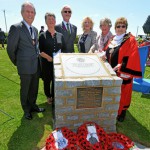 A WAR hero from Eastbourne who lost his life in ‘The Day that Sussex Died’ during the First World War has been commemorated in his home town.
A WAR hero from Eastbourne who lost his life in ‘The Day that Sussex Died’ during the First World War has been commemorated in his home town.
Nelson Carter, who was awarded the Victoria Cross for his bravery at the Battle of the Boar’s Head, died aged 29 in June 1916 when he was shot while rescuing wounded men.
A memorial paving stone and plaque was unveiled at Eastbourne Pavilion Gardens, in a ceremony organised by Eastbourne Borough Council and East Sussex County Council on Saturday (July 2).
Mayor of Eastbourne, Cllr. Pat Hearn, said: “This memorial will ensure that Nelson Carter’s name and the acknowledgement of his courage will live on in his home town for generations to come.
“His award of the highest decoration for valour in the British Army is testament to the incredible bravery he showed in saving wounded men during the height of battle.”
Carter was a Company Sergeant Major in the 12th Battalion Royal Sussex Regiment during an attack at the German positions on June 30, 1916, around the ‘Boar’s Head’ near Richebourg-l’Avoué, in northern France. The attack was intended as a diversion from the planned opening of the Battle of the Somme the following day.
The attack did not go well and the British sustained many casualties and only briefly managed to enter German trenches. When the order to withdraw was given, Nelson Carter proved his bravery.
The London Gazette reported: “Under intense shell and machine gun fire he penetrated, with a few men, into the enemy’s second line and inflicted heavy casualties with bombs.
“When forced to retire to the enemy’s first line, he captured a machine gun and shot the gunner with his revolver. Finally, after carrying several wounded men into safety, he was himself mortally wounded and died in a few minutes. His conduct throughout the day was magnificent.”
Nelson Carter’s body was buried near where he fell in Laventie, France and he was posthumously awarded the Victoria Cross for his heroism.
Attending the unveiling were Colonel Richards – Deputy Lieutenant of East Sussex, Michael Foster – High Sheriff of East Sussex, Cllr Peter Pragnell – Vice Chairman of East Sussex County Council, Cllr Pat Hearn – Mayor of Eastbourne, Colonel Roderick Arnold – President of the Royal Sussex Association and representatives of the Royal British Legion.
Also in attendance were six school children from Langney School, Eastbourne who read a poem they had written. Speaking after the event, they said: “We felt honoured to take part in the ceremony, and really liked the part when we saw the Victoria Cross as we’d only seen one in pictures before.”
After the ceremony Nelson’s grandson Spyke Baker said: “Everyone that I have spoken to thought it a splendid event that appropriately remembered Nelson and all those who served at the Battle of Boar’s Head.
“The contribution of the pupils from Langney Primary School was outstanding and their poem displayed a maturity well beyond their years. Having attended a number of similar occasions with my mum (Nelson’s daughter) while she was alive, I am sure that she would have thoroughly enjoyed the afternoon.”
The attack at the Boar’s Head failed to lure German soldiers away from the Somme and, the following morning, July 1, 1916, the British Army suffered its worst day in history.
Commemorative paving stones are issued by the Department for Communities and Local Government as part of the First World War centenary initiative.
Communities Minister Baroness Williams of Trafford said: “The stone laid in honour of Nelson Carter provides a fitting tribute to his incredible courage and will enable residents of Eastbourne to learn more about a local hero and his role in the First World War.
“Nelson displayed outstanding bravery and we owe a huge debt of gratitude to those heroes who served and lived through the First World War. A century on they are just as inspirational.”


